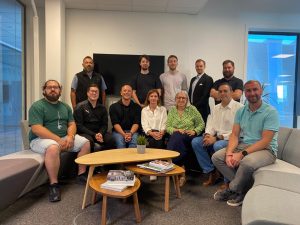July 2022
From July 15 to 31, the 2022 European University Sports Association (EUSA) Games celebrates athletes as university students at the Lodz Technology University (Lodz, Poland). Around 6000 participants (e.g., athletes, referees, sports managers, and volunteers) from 40 countries engage in 20 sports (3×3 basketball, badminton, basketball, beach handball, beach volleyball, chess, football, futsal, handball, judo, karate, kickboxing, para table tennis, sport climbing, swimming, table tennis, taekwondo, tennis, volleyball, and water polo) and educational sessions, making this dual career experience really unique.
In particular, on July 19 a round table on Dual Career was held at the Zatoka Sportu venue. The President of EAS, Laura Capranica, opened the event by summarizing the development, the challenges and the opportunities of the European dual career during the 10 years following the publication of the EU Guidelines on Dual Careers of Athletes (https://ec.europa.eu/assets/eac/sport/library/documents/dual-career-guidelines-final_en.pdf). Furthermore, the good practices, the outcomes and the progresses of the ERASMUS+ projects have been presented as opportunities for further advancement of a European dual career. Finally, the new frontiers of dual career have been illustrated by presenting the ongoing ERASMUS+ projects focusing on the employee-sportspersons (BRAVA-DC, https://www.bravadualcareer.eu/about), the paralympic athletes (Para-limits, https://paralimits.eu), and the entrepreneurship skills (ELCAMP https://paralimits.eu) and the competences on sport innovation (COMPATH) of athletes.
The representative of the Polish Olympic Committee, Ms Luiza Zlotkowska, not only shared the difficulties she encountered at the end of her sport career as an Olympic speed skating athlete, but also the information on dual career challenges reported by 100 Polish Olympic athletes answering a survey on their experience in combining sport and education. Then, she presented the recent engagement of the Polish Olympic Committee in dual career projects, also in cooperation with other European Olympic Committees.
Mr Andreas Czonka, representative of the Swiss University Sports, reported on the aims, approach and operations of dual career in Switzerland, which considers all atypical talented students (i.e., athletes, musicians, actors, and performers), and intends to align private and public players via the Athlete Hub, to improve the dual career coordinator role at the educational institutions and sport bodies, and to promote corporate leaders with a sport background.
As the representative of the International School Sport Federation (ISF) and the Chair of the EPAS Bureau of the Council of Europe, Mr Kole Gjeloshaj illustrated the relevant educational role of sport as an extracurricular activity organized at secondary school level. In being also included in the revised European Sports Charter, dual career should be considered in context of sustainable development and should be extended to all youth sportspersons to prevent early specialization in sport. To note, the ISF Gymnasiade is the only multisport event addressed to school sport athletes regardless of their physical and mental abilities, and being characterized by a balanced sport and educational programme (https://www.isfsports.org).
Mr Andrej Pisl, EUSA Project and Communications manager, underlined that Universities Games represent the proof of dual career being embodied in the educational life of the athletes participating in these competitions. In this respect, he presented several events and projects in which the EUSA Institute has played a role, such as the development of the educational programme for parents of dual career athletes (EMPATIA, https://edu.empatiasport.eu/eng/). At present, EUSA in a partner of the ERASMUS+ “Micro Learning Entrepreneurship for Athletes (MLEA)”, “Brand Value Alignment through Dual Career (BRAVA-DC)” and PRODUCE.
Mr Joerg Foerster, EUSA Executive Committee member and former EAS Secretary, participated in the final panel discussion. The speakers discussed dual career issues, best practices and future initiatives at university, sports, and work levels. In particular, it was highlighted that dual career is relevant to empower sportspersons and to foster their employability.
This event complemented the round table on volunteering in sport, which took place on July 18. Further information is available at https://eug2022.eu

On July 4-5, 2022, the kick-off meeting of the 36-month Erasmus+ project Promoting Employability of Young Student-Athletes through ‘‘Competence Hub on Sport Innovation’’ (COMPATH) was organized in Oslo (Norway) in a blended (face-to-face and online) modality.
The COMPATH Team encompasses 10 Partners from 8 countries: COLLECTIVE INNOVATION AS (NO, Coordinator), FUNDACION UNIVERSITARIA SAN ANTONIO – UCAM (ES), NYSA SWEDEN AB (SE), LOUGHBOROUGH UNIVERSITY (UK), SPORTSKO UCILISTE PESG (HR), MOBILE ADVENTURE SPOLKA Z OGRANICZONA ODPOWIEDZIALNOSCIA (PL), SPORTSKO UCILISTE PESG (HR), MOBILE ADVENTURE SPOLKA Z OGRANICZONA ODPOWIEDZIALNOSCIA (PL), AIFORLIVES GMBH (DE), RAZVOJNA AGENCIJA SISACKO (HR), SPORTIDEALISTEN (SE), and EAS (MT). EAS is represented by Mojca Doupona and Laura Capranica.
The COMPATH Team aims to develop educational resources that will help the youth sportspersons (16-25 years of age) with skills and competencies on sport innovation and technologies under two categories :
Sport-Oriented Technology Skills:
1. Artificial Intelligence and Machine Learning in Sport
2. Big Data Analytics in Sport
3. Drone Technology in Sport Industry
4. Fan Engagement/Experience through Digital Tools
5. Internet of Things in Sport Industry
6. VR/AR/XR in Sport
7. E-Sport and Sports-Focused Gaming
8. Wearables and Equipment for Athletic Performance
Sport-Adapted 21st Century Skills:
9. Sport-Adapted Learning Skills (critical thinking, creativity, communication)
10. Sport-Adapted Literacy Skills (information literacy, media literacy, technology literacy)
11. Career Planning and Entering to Technology-Oriented Sports Business World
12. Entrepreneurial Mindset in Sports Businesses
The project’s objectives directly address the target group of EAS and our network will be actively involved in the pilot implementation phase of the project and will lead to the dissemination of project outputs at the level of sportspersons, sports organizations, and academic institutions in Europe.
During the meeting, the roles and responsibilities of the Partners were agreed, and the timeline was refined and approved. The different expertise of the Partners was highly appreciated considering the ambitious outcomes of the project.



